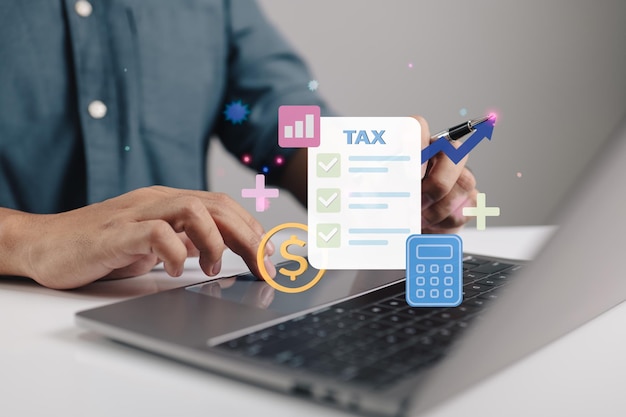Tax relief programs are a way to help people and businesses who find it hard to pay their taxes. Tax departments set these up to give taxpayers a bit of breathing room. Simply put, if you owe taxes and can’t pay them all at once, these programs can help big time.
So, what can these programs do? They can let you pay off your taxes in smaller amounts over time. This way, you don’t have to stress about paying a big lump sum. In some cases, if you’re struggling, they might even reduce the total amount you owe.
Choosing the right tax relief program is like picking the best payment plan for a phone or TV. You need to see which one fits your budget and needs. And the best part? You’re not alone in this. There are tax experts out there who can guide you, helping you pick the right program.
If taxes worry you, remember there are options to make things easier. With the right program, you can clear your tax debts and have peace of mind.

Understanding Tax Relief Programs
When faced with tax debt, navigating the complex landscape of IRS payments can be challenging. This is where tax relief programs come into play, offering various strategies to manage and reduce the amount owed. These initiatives are tailored to help taxpayers resolve their liabilities in a way that doesn’t overburden their financial situation.
Types of Tax Relief Programs
Tax relief programs offer several avenues to address different tax debt issues. Common programs include:
- Installment Agreements: A plan that allows taxpayers to pay off their tax debt in smaller, more manageable increments over time.
- Offer in Compromise: This program permits the IRS to accept a settlement less than the total amount owed if it is unlikely that the full debt can be collected within a reasonable period.
- Penalty Abatement: Taxpayers who have a reasonable cause for not meeting tax obligations may have penalties that have been added to their tax debt forgiven.
- Innocent Spouse Relief: Provides relief from additional tax owed if your spouse or former spouse failed to report income accurately, improperly reported income, or claimed improper deductions or credits.
Eligibility Criteria
Eligibility for tax relief programs is based on specific criteria established by the IRS, which can include:
- Income and Expenses: The IRS evaluates your ability to pay by evaluating your income and necessary living expenses.
- Tax Filing Status: Applicants must be current with all their tax filing requirements.
- Payment History: Your history of attempting to pay taxes or engaging with the IRS regarding payment plans can affect your eligibility.
- Financial Hardship: If paying the total tax would lead to significant hardship, you might qualify for relief.
Understanding and applying for tax debt relief is a critical step towards financial stability. Tax relief programs exist to assist, but they come with an intricate set of rules and requirements for eligibility. If tax debt is weighing you down, it’s worth investigating these options to find a viable pathway to resolve your financial obligations.

How to Access Tax Relief Programs?
Tax relief programs are tailored to assist taxpayers with financial difficulties or who have sizable tax debts. These programs can offer temporary relief or lasting resolutions for tax debt management.
Here is how to apply for these programs and why you might consider getting professional help.
Application Process
The first step in accessing tax relief programs is to understand what relief options are available, ranging from installment agreements to offers in compromise.
- Research: Start on the official IRS website or your state tax authority’s website to find detailed information about the tax relief programs, the criteria for eligibility, and the necessary application forms
- Documentation: Collect all the financial documents you will need. This typically includes recent tax returns, pay stubs, bank statements, and details on your assets and liabilities.
- Complete the Application: Accurately fill out the application forms, ensuring you provide all the required information to prevent any hold-ups or rejections.
- Submit the Application: Submit your completed application as directed. This could mean mailing in paper forms or completing the submission process online.
- Keep a Sound Track: Keep track of your application’s status. The IRS or the state tax department may request further information or clarification.
Get Professional Assistance
Applying for tax relief programs can be done independently, but many find professional help beneficial. That is because:
- Expertise: Tax professionals bring a wealth of knowledge about the different tax relief programs and can recommend the best option for your particular circumstances.
- Efficiency: They can make the application process smoother, ensuring all forms are correctly completed and all necessary documents are included.
- Negotiation: Professionals can negotiate with tax authorities if you owe a substantial amount, potentially reducing the debt or arranging more favorable payment terms.
4. Peace of Mind: Having an experienced professional manage your case can significantly reduce the stress associated with tax debt issues.

Challenges and Misconceptions Surrounding Tax Relief
Misconceptions about Tax Relief
There’s a common belief that tax relief is a form of deceit or isn’t available to the average taxpayer. People often assume that they must handle their tax issues without any help.
Qualifying for Tax Relief
Taxpayers frequently underestimate their eligibility for tax relief programs. The complexity of the application process can deter individuals from seeking the relief they may qualify for.
Solutions for Back Taxes
Options like payment plans or settlements for less than the amount owed are available but often overlooked. Consultants can help determine the best approach to managing and resolving unpaid taxes.
When you address these challenges and misconceptions head-on with the help of a professional tax consultant, taxpayers can take proactive steps towards resolving their tax issues.
In conclusion
Financial freedom is a common goal, and tax relief is crucial if you’re in a tussle with large debts. It’s a helping hand, allowing individuals and businesses to manage their tax responsibilities without the weight of undue stress. Tax relief help is not just about overcoming immediate fiscal hurdles; it’s about setting the stage for long-term financial health.
By seeking help, you can navigate your financial obligations more comfortably, creating room to grow and invest in your future. It’s about making a positive step towards a financially sound life with the guidance and support needed to make informed decisions.

Frequently Asked Questions
How to pay back taxes?
To pay back taxes, assess the total amount owed, either pay in full via online, phone, or mail, or set up an installment agreement with the IRS for gradual payment. For assistance, consult a tax professional.
How to reduce taxes owed to IRS?
Reduce taxes owed by negotiating payment plans or seeking reductions via offers in compromise if eligible. Maximize deductions and credits, and consider contributions to retirement or health savings accounts.
Is debt forgiveness taxable?
Debt forgiveness is often considered taxable income, with some exceptions like insolvency or certain forgiven student loans. Check IRS guidelines or consult a tax advisor for your specific case.
How do tax relief companies work?
Tax relief companies negotiate with the IRS to manage or lower your tax debt through various programs and services, ensuring you get experienced guidance to resolve your tax issues efficiently. It’s crucial to choose a reputable tax relief company, as they will be responsible for providing guidance in paying back taxes and navigating complex tax laws to achieve the best possible outcome